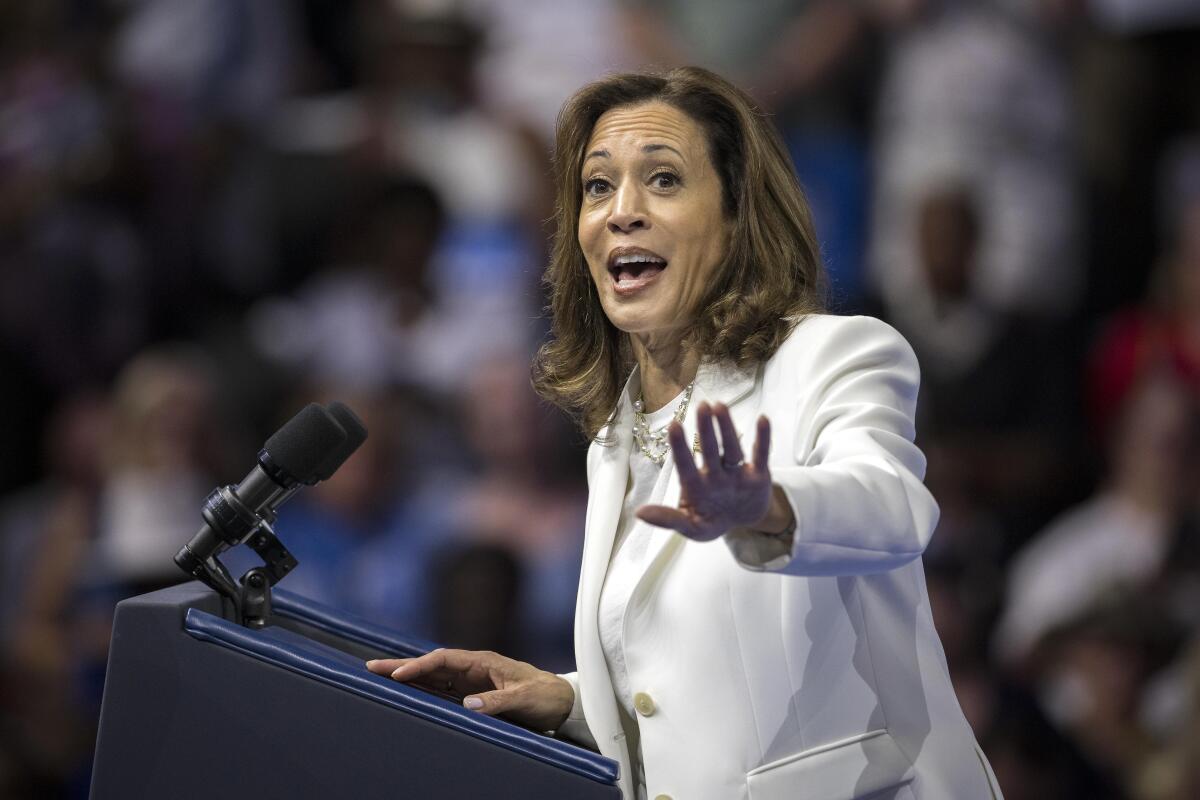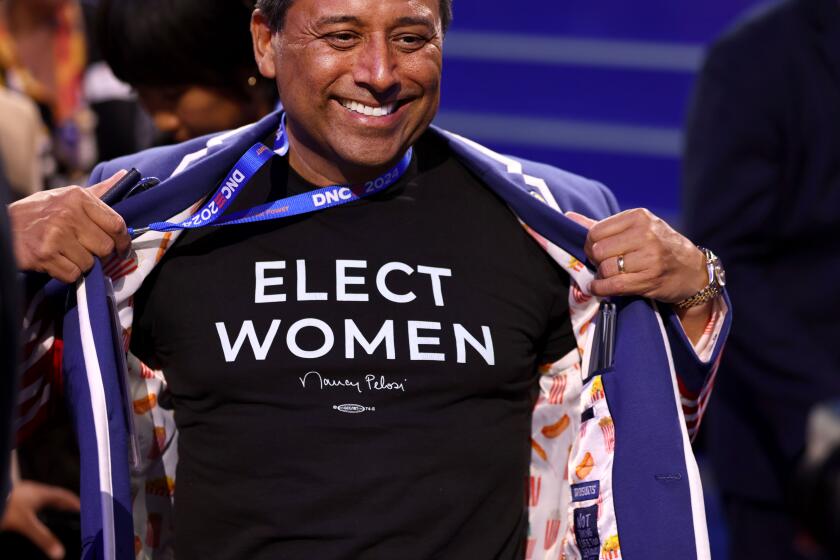Opinion: This could be Kamala Harris’ Achilles’ heel with crucial undecided voters

Kamala Harris has had a strong start to her presidential campaign, but the remaining weeks leading up to the Nov. 5 election will be closely contested and Harris faces real obstacles.
She must articulate her own positions to separate her candidacy from some of the less popular policies and outcomes seen during the Biden-Harris administration. And as she fills in the details, her plans will be picked apart, diminishing her chances to sway voters in the swing states that will decide the 2024 election.
In important policy areas, Harris has undergone an almost complete transformation, switching from unabashed progressive to careful centrist. Some voters will question the authenticity of her revised views. But for others, inconsistency won’t be the problem. It’s the policies themselves — appealing at first but ineffective, challenging to implement or more progressive than most Americans are comfortable with. It’s policy, therefore, that could prove to be the Achilles’ heel in Harris’ efforts to keep Trump from a second term.
It was not Biden who fumbled the pandemic response and sent the economy reeling. Trump caused the problem he’s complaining about.
In her first extensive media interview since becoming the Democrats’ 2024 standard-bearer, Harris argued that voters should be comfortable with her reversals because her “values” have not changed. Maybe so, but voters will wonder what her values could cause her to do once elected.
On domestic energy exploration, Harris has gone from saying in 2019 that she opposed fracking and offshore oil drilling to noting that she would not seek to ban fracking after all. On healthcare that same year, the then-presidential primary candidate was an ardent supporter of Medicare for All, a reform to institute a government-run system that would significantly disrupt existing coverage arrangements. But a campaign spokesman recently said that she no longer favors this plan.
Similarly, on immigration policy — a topic that voters earlier this year in a Wall Street Journal survey identified as their 2024 top issue — Harris has struck an aggressive tone and changed positions on the Trump border wall, embracing the recent bipartisan border security bill that includes $650 million in funding for the wall, while walking away from her previous support for decriminalizing illegal border crossings.
In other issue areas, it’s simply the weaknesses in the ideas she’s proposed that will dog her. This is particularly the case with some of her economic policy proposals.
Kamala Harris isn’t making a big deal out of the first woman president thing. Does that mean America is ready?
Her housing plans, for example, include an idea that sounds appealing at first: providing $25,000 in down-payment assistance to first-time home buyers, as well as an additional $10,000 tax credit for purchasing a home. Such a plan would increase demand for new homes but, without significant additional supply, would also likely increase home prices for those it intends to help and potentially others in the market for a new home as well. (It’s worth noting that Harris has also proposed incentives for developers who build starter homes, as well as making it possible to build new affordable housing on federal lands. But in supply-constrained states like California, these proposals alone may not create sufficient inventory to lower prices.)
Harris has conceded that food prices still remain far too high for too many Americans, but her solution — a federal ban on price-gouging — has been panned by even some progressive economists as counterproductive to encouraging the macroeconomic trends that would bring down prices. Her plan would do nothing to change the factors that drive up food prices — supply chain challenges, geopolitical conflicts and high energy costs to name a few — and it’s unclear that a president would be able to do much, if anything, to address these root causes, in any case.
Then there’s the fact that lawmakers from her own party have said that Harris’ price-gouging idea wouldn’t pass Congress, even if Democrats win a majority in both chambers, and would be difficult to implement as well. It’s also a lightning rod for opposition from conservatives who can easily equate it to the price controls seen in some economies around the world.
Finally, there are Harris’ proposed $5 trillion in tax increases.
The guardrails argument against Trump is often made in a vacuum. It lacks comparison with what’s been transpiring with President Biden and his vice president, Kamala Harris.
She’s called for raising the corporate tax rate from 21% to 28%, after Congress enacted the lower rate and Trump signed it into law in 2017. But this would only serve to restore incentives for companies to locate elsewhere to avoid paying the higher rates.
Perhaps most controversial is the Harris plan to create a new wealth tax, which would require some high net-worth families to pay taxes each year on the value of their assets, even if they remain unsold. The taxation of what are known as unrealized capital gains is problematic for many reasons, not the least of which are the administrative challenges in collecting the tax and the issues created by trying to accurately value assets that fluctuate over time or aren’t publicly traded.
For most voters in most states, the policy proposals of either presidential candidate won’t matter. They’ve made up their minds. But for the few remaining undecided voters in swing states, what Harris has proposed and how she defends and explains her future policies may very well be dispositive. To secure their support, she’ll have to hope that these Americans forgive the inconsistencies in her record and the deficiencies in what she’s proposed thus far.
Lanhee J. Chen is the David and Diane Steffy Fellow in American Public Policy Studies at the Hoover Institution. He was a candidate for California state controller in 2022 and served as policy director of Mitt Romney’s 2012 presidential campaign.
More to Read
A cure for the common opinion
Get thought-provoking perspectives with our weekly newsletter.
You may occasionally receive promotional content from the Los Angeles Times.













